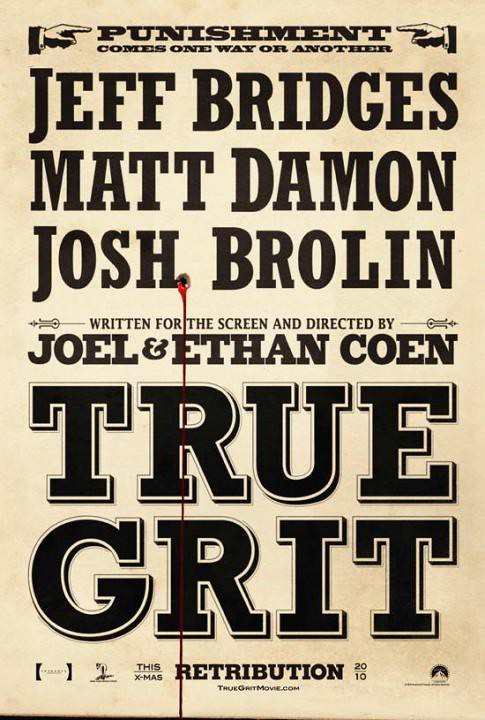
It's always extremely difficult for me to unpack a Coen Brothers film after only a single viewing, and even though this one follows a slightly more linear and direct storyline than many of theirs (possibly owing to its adaptation from a western novel), it still unwinds at a pleasantly unpredictable pace. Mattie Ross is constantly offering up legal advice or threatening legal action, bringing the promise and threat of sterile civilization into the obviously wild Indian Territories. This is met with a variety of reactions, but primarily one of grim acceptance. Nobody scoffs at her, nobody once tells her how ridiculous it sounds to offer an outlaw the name of a good lawyer in a cabin in the deep woods as he faces a Mexican standoff with an ornery and trigger-happy U.S. Marshall. Lucky Ned Pepper is one of many men for whom a lawyer may do precious good; he tells her "I don't need a lawyer, I need a judge." The introduction to the character and M.O. of Rooster Cogburn is through a court hearing. The story is clearly concerned with the intersection of law and lawlessness, and even goes so far as to have Texas Ranger La Boeuf and Mattie discuss the latin terminology for a crime that is "illegal because it is wrong" versus "illegal because of our customs and mores."
Another recurring motif is the use of guns. Of course first and foremost as weapons, and nearly every time a gun goes off it has an impact, either as a shocking burst of instant death (at close quarters) or as a deceptively ineffectual way of putting down an enemy (from a distance): missing when firing is a repeating theme in this story. But guns aren't just weapons in True Grit, but also modes of communication, devices of warning, or even tools for scaring off natural predators like buzzards. The number of times a gunshot is used to communicate at great distances or to signal for help adds a new layer of potency and utility to the already strongly symbolic item.
Also, there is something in the end that I need to spend more time with. [SPOILERS!] What does it mean that La Boeuf never returns (despite some well-played sexual tension between him and Mattie)? What does it mean that Mattie lost her hand, spends her days as a one-armed unmarried seamstress, on her way to full-on crone status? And what does it mean that after it was all over, she missed reconnecting with Rooster by a mere three days, and was left to simply describe everything she'd been through as "adventures"? Does it mean it was all for naught? That revenge ruined her life and never left her, and drove apart the three comrades who had worked together to accomplish it? I am sure I'll have more thoughts when I've seen it more than the one time. It comes out around Christmas, and I know I'll be seeing it then, so it won't be long. But one viewing is never enough to get your head around a film by Coen Brothers.

No comments:
Post a Comment